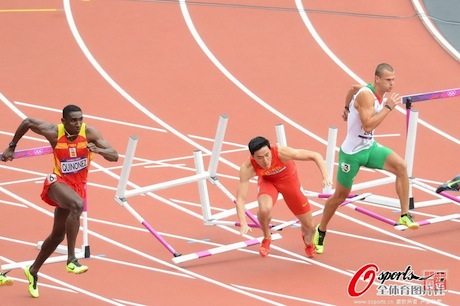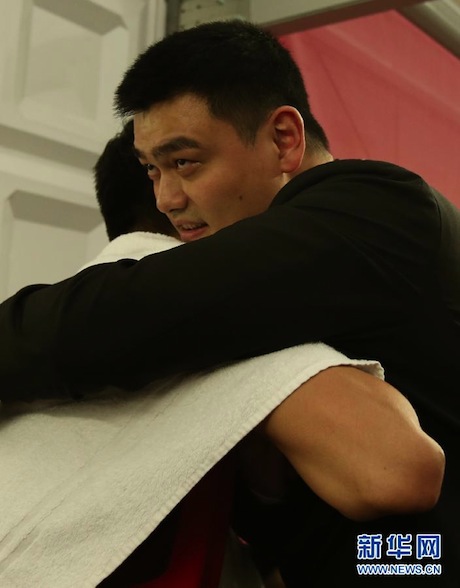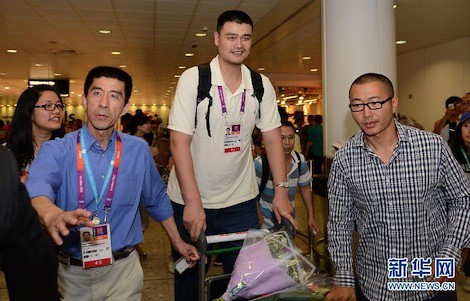Great article: How Chinese national team basketball is changing
Thursday, August 9th, 2012
by John
Although the men’s Chinese basketball team lost all 5 of their Olympic games by 25.2 points per game, the AP published a pretty good piece on how they have started to practice more like Western teams, thanks to American coach Bob Donewald.
I highly recommend the article. Below are just a few excerpts I thought were interesting:
“I told him in 2010, there’s two most difficult jobs in the world right now,” veteran center Wang Zhizhi said through an interpreter. “One is saving the miners in Chile and the other one is taking over the Chinese men’s basketball team.”
“I know there’s some talent coming up,” said Donewald, who coached his last game with China on Monday. “I just hope it’s developed properly. It’s got to start young and it’s got to be done in the right way.”
In three years at the helm, Donewald and Philo managed to change some aspects of China’s rigid basketball program. Donewald negotiated the power to choose the team, a huge departure for a CBA that has dictated the roster, coaching staff and even bed times for players. The players no longer wear themselves out with eight hours a day of practice and the focus has shifted to defense.
“I’m the first coach in the history of this damn thing to be able to pick my staff and the roster,” Donewald said over dinner at the Westfield Mall. “And now that was my speech to the players. ‘I picked you. I picked you for a reason.’
“It also gave me the ability to say, if you don’t play any defense, you’re out of here.”
When Donewald first laid down the defense-first edict, Zhizhi told him, “This is China. We don’t play defense.”
Whenever a player did not talk on defense, his name was put on a board with a check mark by it. The more checks, the more sprints he had to run after practice.
“What we try to do is point out that basketball culture is different than culture culture,” Donewald said. “In Chinese culture, you don’t talk a lot. It’s very reserved. In basketball you have to talk. You have to be outgoing. So what we’ve tried to do is to get a basketball culture when you step between the lines, there was a little more talking to it.”
In a developmental system where every decision is made for them, they have tried to instill some sense of individualism, some “swagger,” as Philo likes to put it.
Although the men’s Chinese basketball team lost all 5 of their Olympic games by 25.2 points per game, the AP published a pretty good piece on how they have started to practice more like Western teams, thanks to American coach Bob Donewald.
I highly recommend the article. Below are just a few excerpts I thought were interesting:
“I told him in 2010, there’s two most difficult jobs in the world right now,” veteran center Wang Zhizhi said through an interpreter. “One is saving the miners in Chile and the other one is taking over the Chinese men’s basketball team.”
“I know there’s some talent coming up,” said Donewald, who coached his last game with China on Monday. “I just hope it’s developed properly. It’s got to start young and it’s got to be done in the right way.”
In three years at the helm, Donewald and Philo managed to change some aspects of China’s rigid basketball program. Donewald negotiated the power to choose the team, a huge departure for a CBA that has dictated the roster, coaching staff and even bed times for players. The players no longer wear themselves out with eight hours a day of practice and the focus has shifted to defense.
“I’m the first coach in the history of this damn thing to be able to pick my staff and the roster,” Donewald said over dinner at the Westfield Mall. “And now that was my speech to the players. ‘I picked you. I picked you for a reason.’
“It also gave me the ability to say, if you don’t play any defense, you’re out of here.”
When Donewald first laid down the defense-first edict, Zhizhi told him, “This is China. We don’t play defense.”
Whenever a player did not talk on defense, his name was put on a board with a check mark by it. The more checks, the more sprints he had to run after practice.
“What we try to do is point out that basketball culture is different than culture culture,” Donewald said. “In Chinese culture, you don’t talk a lot. It’s very reserved. In basketball you have to talk. You have to be outgoing. So what we’ve tried to do is to get a basketball culture when you step between the lines, there was a little more talking to it.”
In a developmental system where every decision is made for them, they have tried to instill some sense of individualism, some “swagger,” as Philo likes to put it.





